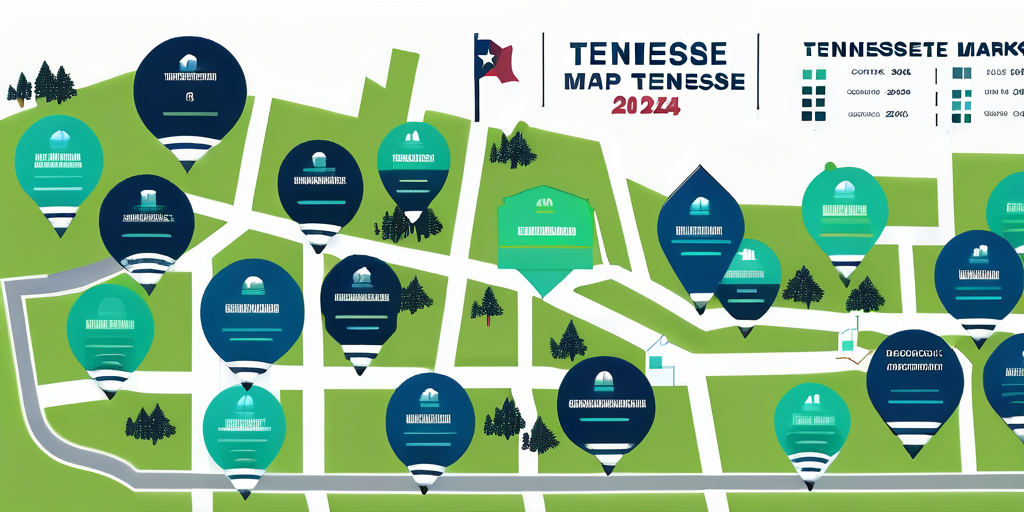
The Tennessee real estate market is blossoming, transforming into one of the most dynamic property arenas in the United States. As we move into 2024, buyers and sellers alike should prepare themselves to navigate through a landscape that is both challenging and ripe with opportunities. Understanding the nuances of this market is crucial to making informed decisions that align with current trends.
Several key factors play crucial roles in shaping the Tennessee real estate market. First and foremost, the economic environment significantly influences buyer behavior and property values. Factors such as job growth, wage increases, and interest rates are paramount in determining market stability and growth.
Additionally, migration patterns have notably impacted local markets. With more people relocating to Tennessee for its affordable living costs and a robust job market, we see an increased demand for housing, which drives property prices up.
Lastly, government policies, including tax incentives and zoning laws, can also affect real estate trends. Developers and investors must stay abreast of legislative changes that could impact property values and available investment opportunities. Furthermore, the introduction of programs aimed at first-time homebuyers can stimulate demand, particularly in urban areas where affordability remains a concern.
As of late 2023, Tennessee's real estate market is relatively strong, with residential properties often seeing bidding wars due to limited inventory. Many regions have experienced surges in prices, and many homes are selling faster than ever before. In Nashville, for example, the demand for homes has soared, driven by its booming economy and vibrant cultural scene.
In contrast, while rural areas might not have the same level of price intensity, they are beginning to see increased interest from buyers seeking larger properties and a quieter lifestyle amid post-pandemic shifts in remote working. This trend is particularly evident in areas like East Tennessee, where natural beauty and outdoor recreational opportunities attract families and retirees alike.
Moreover, the rise of technology and remote work has led to a shift in how people view their living situations. Many are prioritizing home office spaces and proximity to nature, which has led to a surge in demand for properties with larger lots and additional amenities. This shift is causing a ripple effect in the market, pushing developers to rethink their project designs and focus on creating community-oriented spaces that cater to the evolving needs of buyers.
Overall, it is an exciting time to be active in the Tennessee real estate market, but everyone involved should approach with a well-informed strategy and keen understanding of their desired area. As the market continues to evolve, staying informed about local trends and economic indicators will be essential for making sound investment decisions.
As we look towards 2024, several trends are expected to emerge or expand within the Tennessee real estate market. Being aware of these trends can help buyers, sellers, and investors adapt accordingly and leverage the opportunities they present.
The economy is always evolving, and its fluctuations will undoubtedly shape the Tennessee real estate market in 2024. Interest rates, for instance, may fluctuate as the Federal Reserve adjusts policies to combat inflation. Higher rates could deter some potential buyers, while others may rush to purchase homes before rates rise even higher.
Moreover, employment rates and wage growth will remain pivotal. Areas with strong job growth, such as tech hubs or healthcare centers, will likely continue to attract new residents, which will support demand for real estate in these locales.
The interplay between these economic factors will create a multifaceted environment that buyers and sellers must navigate carefully to capitalize on the most favorable conditions. Additionally, the potential for increased remote work could lead to a shift in where people choose to live, with many opting for suburban or rural areas that offer more space and affordability compared to urban centers. This trend could lead to a revitalization of smaller towns in Tennessee, as they become more appealing to those seeking a balance between work and lifestyle.
It's no secret that buyer preferences have shifted in recent years, and these changes are likely to continue into 2024. Homebuyers are increasingly looking for properties that not only meet their current needs but also align with their lifestyle choices.
For instance, there has been a noticeable uptick in demand for homes equipped with home offices, energy-efficient appliances, and outdoor spaces. Buyers are also factoring in lifestyle amenities, such as proximity to parks, schools, and public transportation.
Additionally, younger generations are beginning to enter the market, which brings a fresh perspective on what they want in a home. This generation values sustainability and smart home features, so sellers should consider these preferences when preparing their properties for sale. Furthermore, the rise of community-oriented living is becoming increasingly important, with many buyers seeking neighborhoods that foster social interaction and provide access to shared amenities like community gardens, fitness centers, and walking trails. This trend reflects a broader desire for connection and well-being in a post-pandemic world, influencing not just individual home choices but also the types of developments that are likely to thrive in the coming years.
As we analyze the real estate market, it's essential to examine different types of properties to understand where the best opportunities lie. From residential to commercial, each sector presents unique insights and forecasts for the upcoming year.

The residential real estate market in Tennessee is expected to remain robust heading into 2024. With a growing population and increased urbanization, cities like Memphis and Nashville are seeing strong demand for single-family homes, townhouses, and condos.
However, as inventory remains tight, prices for residential properties are likely to continue climbing, albeit at a slower pace than in previous years. Buyers should be prepared for possible market corrections and ensure they conduct comprehensive market research before making a purchase.
Furthermore, for those interested in investment, looking into upcoming neighborhoods that show signs of revitalization could yield great returns. Areas that are undergoing infrastructure improvements or have plans for new amenities often attract buyers and renters alike, thus increasing property values. For instance, neighborhoods that are integrating green spaces or enhancing public transportation options are particularly appealing, as they cater to a demographic that values sustainability and accessibility.
The commercial real estate sector in Tennessee is poised for considerable growth as businesses seek locations to accommodate a workforce that is increasingly returning to in-person operations. As cities continue to expand, demand for office spaces, retail spots, and warehouses will also rise.
Investors looking at commercial real estate should pay extra attention to the continued evolution of consumer behavior, particularly post-pandemic trends that favor mixed-use developments and personalized retail experiences. The shift towards remote work has also prompted companies to rethink their office layouts, leading to a demand for flexible spaces that can accommodate both collaborative work and individual tasks. This trend is likely to influence the design and functionality of new commercial properties.
Moreover, logistics and e-commerce will remain integral components of the market, with Tennessee's central location making it a prime hub for distribution and storage facilities. As online shopping continues to thrive, the need for last-mile delivery centers is becoming increasingly critical. Investors should consider properties that can adapt to the changing landscape of retail and logistics, such as those equipped with advanced technology and sustainable practices to meet the growing demands of environmentally conscious consumers.
The diversity of the Tennessee landscape means that real estate trends vary from region to region. Understanding these regional differences will help investors and buyers make informed decisions tailored to their needs.

Urban areas like Nashville and Chattanooga are experiencing rapid growth, driven by job opportunities and vibrant cultural scenes. This urbanization trend leads to heightened competition for housing, propelling prices upward. The influx of residents has also spurred a wave of new construction projects, from high-rise apartments to luxury condominiums, catering to the diverse preferences of a growing population. As a result, urban neighborhoods are evolving, with a focus on mixed-use developments that combine residential, commercial, and recreational spaces, creating a dynamic living environment.
Conversely, rural areas are gaining interest, especially since many people are choosing to leave dense cities for more spacious living conditions. Properties that provide privacy and land are increasingly sought after, creating a unique market dynamic that rural sellers can capitalize on. Additionally, the rise of remote work has made rural living more feasible for many, allowing families to enjoy larger homes and outdoor spaces without sacrificing their careers. This shift has led to an increase in demand for properties with acreage, and many buyers are looking for homes that offer not just a place to live, but a lifestyle that includes gardening, outdoor activities, and a closer connection to nature.
The contrast between urban and rural markets exemplifies the diverse needs of buyers in Tennessee, and both areas have unique opportunities worth exploring. Whether one is drawn to the bustling energy of a city or the serene landscapes of the countryside, the real estate market in Tennessee offers something for everyone, making it a compelling place for investment.
Several hotspots are emerging in Tennessee for real estate investment in 2024. Nashville remains the lead contender due to its vibrant economy and cultural appeal. Various sectors, including the medical and tech industries, keep driving demand. The city's music scene, renowned festivals, and culinary offerings further enhance its attractiveness, drawing in both residents and tourists alike. As a result, the demand for short-term rental properties has surged, presenting lucrative opportunities for investors looking to capitalize on the influx of visitors.
Meanwhile, cities like Knoxville and Murfreesboro are quickly rising as attractive alternatives for investors. Closed to larger metropolitan areas while still providing a more affordable cost of living, these towns are becoming prime targets for new developments and residential projects. The local governments are actively promoting growth through incentives for businesses and infrastructure improvements, which further enhances their appeal. Additionally, the presence of educational institutions in these cities fosters a steady demand for rental properties, making them ideal for investors seeking long-term returns.
Investors should also consider suburbs of major cities, where rapid growth and community enhancements are drawing newcomers seeking a balance of urban amenities and suburban tranquility. Areas like Franklin and Brentwood are witnessing a surge in family-oriented developments, with parks, schools, and shopping centers being prioritized. This trend not only attracts families but also enhances property values, making these suburbs a hotbed for real estate investment. As the demand for housing continues to rise, understanding these emerging trends will be crucial for anyone looking to navigate the Tennessee real estate landscape effectively.
As we look ahead, it’s vital for all stakeholders—buyers, sellers, investors—to equip themselves with strategies for thriving in the Tennessee real estate market. Knowledge is power when it comes to making decisions that can significantly impact financial wellbeing.

For buyers, staying informed on market conditions is crucial. Work with knowledgeable real estate agents who can provide localized insights and supply data on market trends to improve your buying strategy.
Sellers should consider optimizing their properties by investing in home improvements that could broaden their appeal. Things like modern upgrades or curb appeal can significantly enhance perceived value and attract more qualified buyers.
Negotiation skills will also play a pivotal role, and both parties should aim to understand the current climate to negotiate fair deals.
Lastly, investors should adopt a long-term perspective when it comes to real estate. Consider properties that will continue to serve your investment goals beyond immediate returns. Look into the potential for growth in less developed areas, as well as diversification across different property types.
Long-term investors need to be strategic about their acquisitions, examining trends that will likely evolve and influence future market dynamics. Understanding zoning laws, population growth, and regions’ economic outlooks are wise steps toward prudent investment choices.
Overall, whether you're looking to buy, sell, or invest, preparing for an exciting, evolving real estate landscape in Tennessee will be vital as we make our way into 2024.